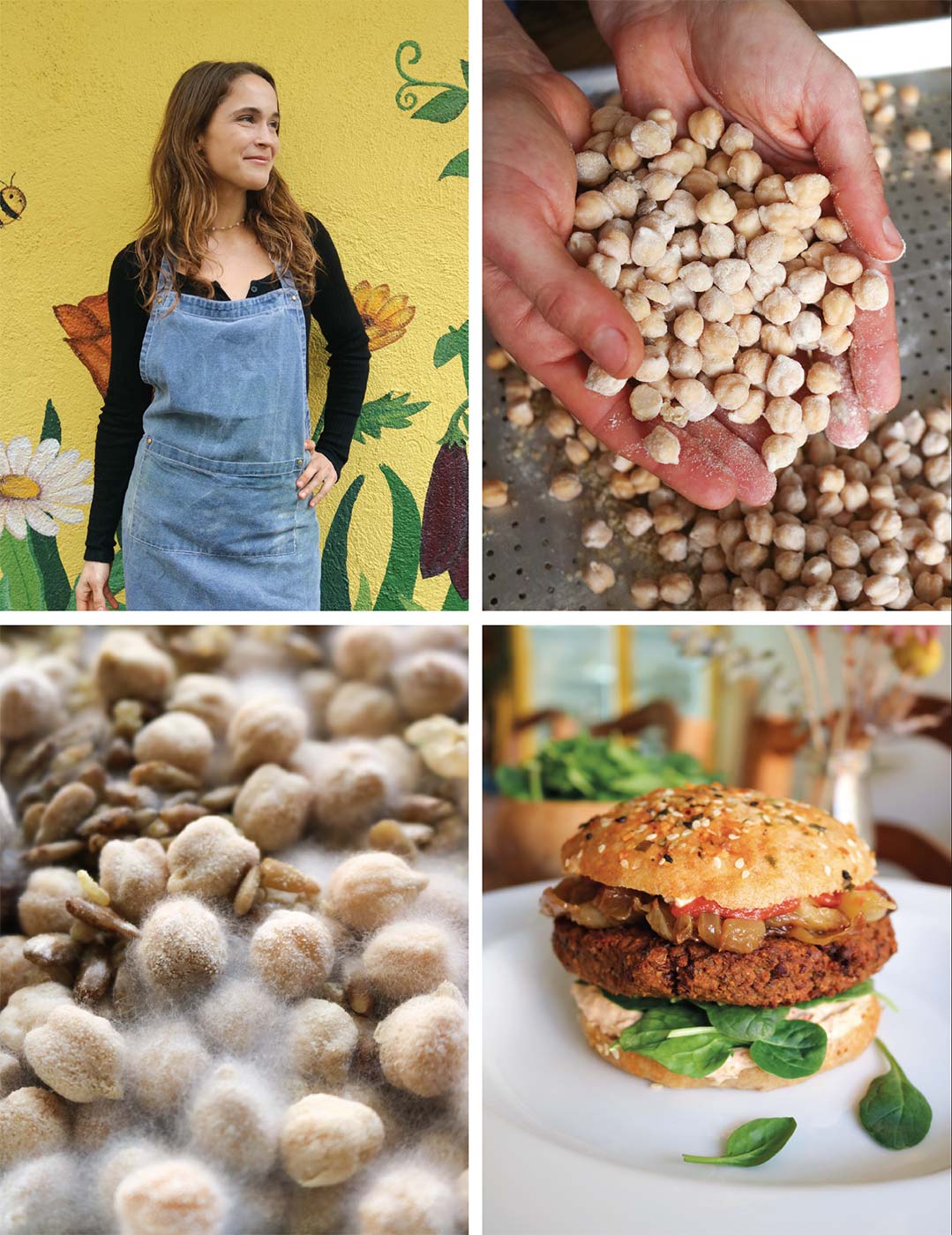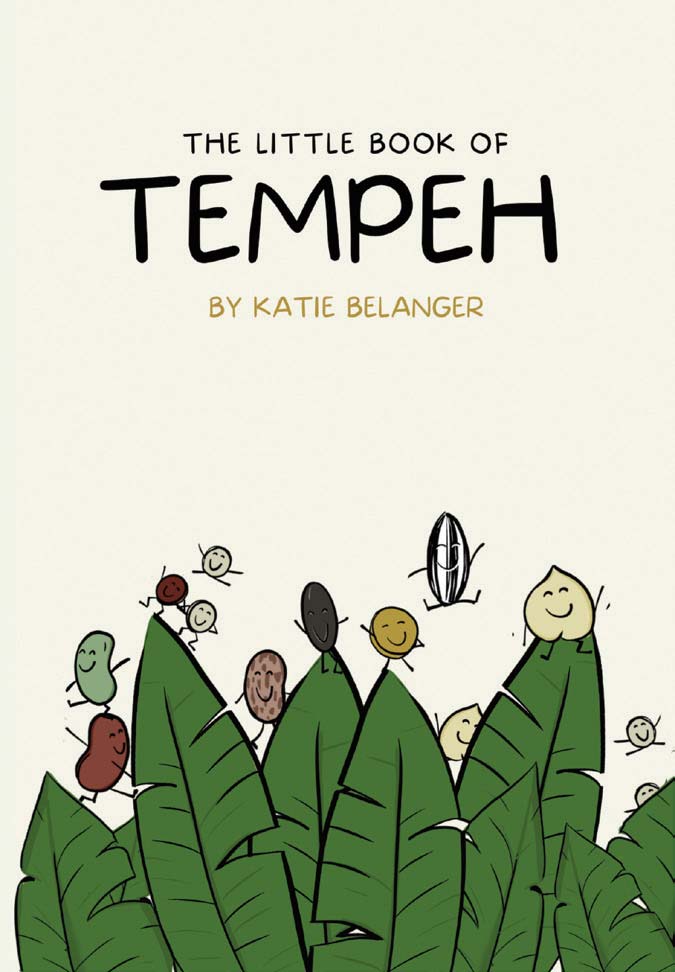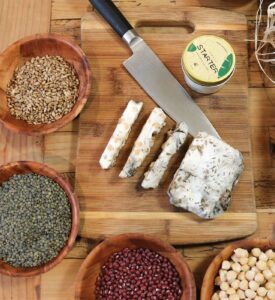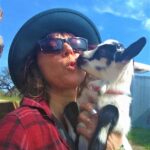
Tempeh is about to hit the big time, if Funky Bean founder Katie Belanger has her way
PHOTOGRAPHY BY ANGEL WELCH
Just call Katie Belanger the mistress of mold. The owner of Santa Cruz’s Honey B Market is on a mission to raise the profile of nutrient-dense, fermented, plant-based foods and increase their accessibility in the marketplace, starting with fresh tempeh and her new business called Funky Bean.
Traditionally made from cooked, fermented soybeans, tempeh originated on Java and has been a staple of Indonesian cuisine for over 400 years. After cooking, the legumes are inoculated with Rhizopus oligosporus mold (also known as a starter culture), although other mold substrates may also be used. The beans are then wrapped in banana leaves to ferment for a minimum of 24 hours, during which time they form a dense, pungent cake that is bound together by cottony strands of mycelium. The end product has an earthy, mushroom- like quality that holds up well during cooking and can be used in any number of dishes.
With Funky Bean, Belanger is endeavoring to make and sell fresh tempeh. As of this writing, she is the only company in the U.S. to do so. “Commercial tempeh is pasteurized to be shelf stable, but the process also kills off all of the beneficial bacteria and nutrients,” she says. “It also tastes completely different. Until I started making my own tempeh, I didn’t like it because I found the flavor sour and offputting. But fresh tempeh is super umami, with mushroomy, floral notes, depending on what kind of beans you use.”
Belanger grew up in the suburbs of Chicago, one of six siblings in a single-parent home. “I had to cook for everyone, and that was the first insight I had into how food unites people,” she says. “But we also ate a lot of processed stuff because it was both convenient and affordable. It wasn’t until I moved out that I realized what I ate had a huge impact on how I felt. The more I educated myself, the more I understood that food is medicine.” At the same time, Belanger also started to vacillate between a vegetarian and vegan diet. “I don’t have anything against meat; I just don’t like the way it tastes,” she says.
In 2014 Belanger moved to California, which she thought of as the epicenter of healthy food and wellness, but realized that while there was an abundance of vegan food options, most of them were lacking nutrients. After winning a TV culinary competition that same year, she found herself with the funds to open her first venture, Honey B Market, in Santa Barbara.
The cafe was a hit from the start, and Belanger made a name for herself with her array of sourdough breads and pastries, plant-based spreads, entrées and pickled foods. After the pandemic hit, Belanger decided to shutter the cafe and took a two-month road trip up the West Coast to “study the marketplace” and figure out her next steps. It was around this time that she also began to experiment with making tempeh.
“During COVID, everyone was making sourdough, and I went down the rabbit hole of fermented foods as well. I realized that when tempeh is fresh, it’s a really delicious complete protein. Even when I was eating a lot of eggs, they always left me feeling nutritionally unsatisfied; tempeh changed my life.”
In 2021, Belanger relocated to Santa Cruz after identifying a niche for her particular brand of vegan offerings, and a new iteration of Honey B Market opened on Cedar Street in December of 2022.
She applied for a wholesale permit when she opened Honey B with the goal of selling her tempeh to local retailers, but she got sidetracked running the cafe. “I was basically a one-woman show and when I finally got my wholesale permit in December of 2023, I decided it was time to put Honey B on pause so I could focus on launching Funky Bean,” she says. “Creating a tempeh brand has always been the goal; it’s such a nutritious, affordable protein.”
“Creating a tempeh brand has always been the goal; it’s such a nutritious, affordable protein.”

While soybeans are traditionally used for tempeh, Belanger avoids them. “They’re problematic for some people because they contain some well-known allergens, and I don’t like using them because they’re the most heavily genetically modified crop,” she says.
Instead, Belanger makes tempeh from adzuki beans, which she says have a higher nutrient density, as well as chana dal, black beans and chickpeas. “Using different types of beans is also a great way to showcase different flavor and texture profiles,” she says. “I find that lighter colored beans like chickpeas tend to have a slightly sweeter, almost fruity flavor, while darker beans are more pungent, although that mellows if you cook the tempeh.”
Fresh, uncooked tempeh isn’t for everyone. Once heated, however, tempeh mellows and takes on more of a nutty quality, with the mycelium acting similar to marbling in meat. “It adds this rich, almost fatty quality,” says Belanger. “It can be used in soups, stews, pan-fried, baked; it’s just so versatile.”
One of the biggest misperceptions about tempeh is that it’s hard to digest, but in fact, the opposite is true. “Beans are an amazing source of protein, but some people just can’t digest them,” says Belanger. “The fermentation process breaks down the bean sugars that can cause gas and bloating, and tempeh actually improves digestion, which is a quality other, more highly processed plant-based foods like tofu and seitan [made from wheat gluten] don’t possess. The more you manipulate a food, the more it changes its nutritional value.”
With Funky Bean now in its early stages, Belanger—who has also written and illustrated a how-to guide called The Little Book of Tempeh—is working on a line of plain and marinated tempeh and prepared foods like burger patties and hot dogs, all of which are sold frozen. Because tempeh is a living organism, it has a short shelf life (between five and 10 days; frozen it will keep up to one year).
Belanger will also be offering workshops on making tempeh, sourdough, pickling and more, and selling starter cultures and tempeh kits. “I want to normalize making it at home,” she says. “It’s time for tempeh to step into the spotlight.”

About the author
Laurel Miller is a food, spirits and travel writer and the former editor of Edible Aspen. She grew up on a California ranch and has been writing about regenerative agriculture for over 20 years. When she’s not tethered to her laptop, Miller enjoys farmers markets and any trip that requires a passport. She’ll take a Mission burrito over a Michelin star, any day.
- Laurel Millerhttps://www.ediblemontereybay.com/author/laurelmiller/
- Laurel Millerhttps://www.ediblemontereybay.com/author/laurelmiller/
- Laurel Millerhttps://www.ediblemontereybay.com/author/laurelmiller/
- Laurel Millerhttps://www.ediblemontereybay.com/author/laurelmiller/



